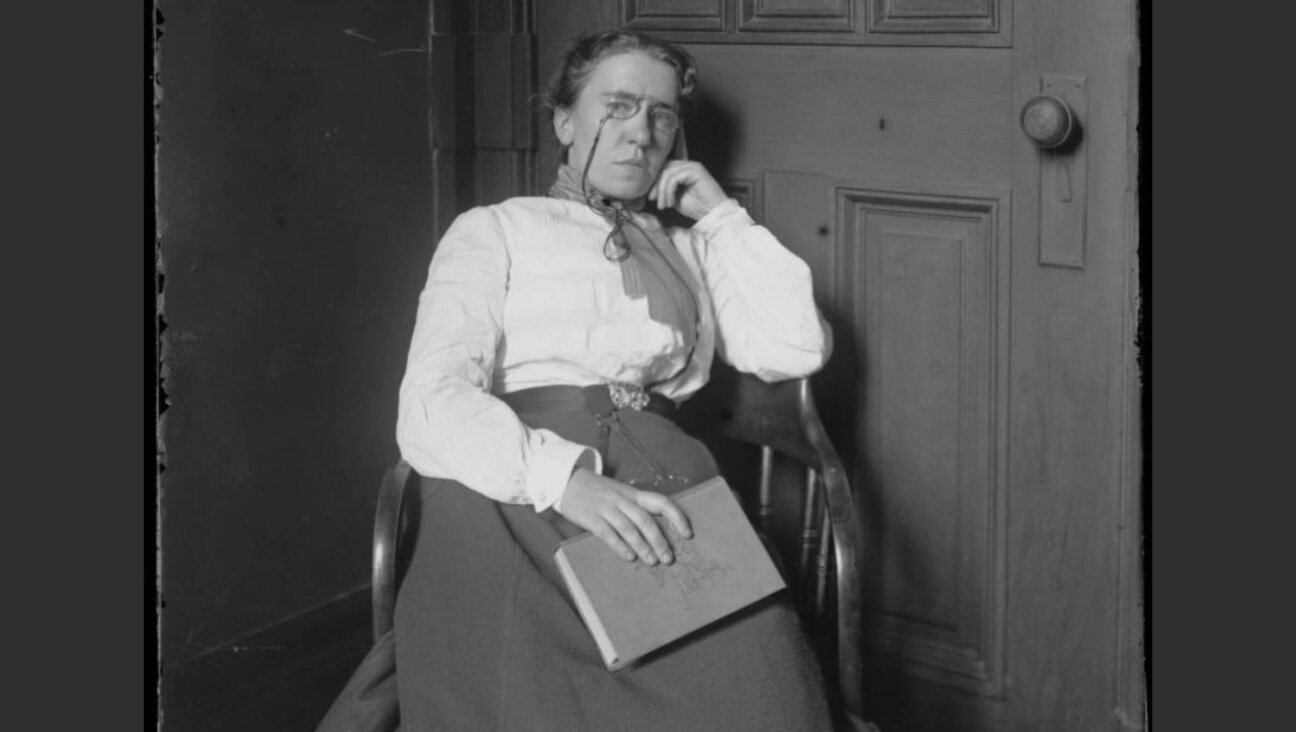‘Hoaxocaust’ Is As Controversial As It Sounds

Graphic by Angelie Zaslavsky
Barry Levey wants a Jewish identity free of victimhood.
Confronting his brother’s interfaith marriage, his mother’s objection to the union and his LatinX boyfriend’s insistence that the Jewish story is no longer one of persecution, he begins to wonder: What would it be like if the Holocaust never happened? “Imagine how much easier life would be, being Jewish would be.” The defensiveness: Gone. The guilt about disagreeing with Israeli policies: Gone. But what else disappears?
In “Hoaxocaust,” Levey’s satirical one-man show, directed by Jeremy Gold Kronenberg, now playing at the 14th Street Y, these questions take Levey on an international journey to speak with well-known Holocaust deniers. Levey presents the conversations as if they were real, but you catch on fast – well before a last minute reveal – that they’re imagined. If this concept makes you squirm, that’s partly by design.
The play is made to challenge its audience, ending with a call to confront the mounting mob of Shoah revisionists. But the way it handles it all is a bit cockeyed. In fact, as the text itself suggests, people that go in with doubts about the Holocaust – unlikely given the venue – may well have them confirmed. As one character says in the play: “What most people wish to be true, is true.”
Though the show premiered in 2009 at the 59E59 Theaters, and had its most notable performance as FringeNYC 2014, where it won the Overall Excellence award, it’s been updated by Levey, who, as he admits, is a writer first and an actor second (Mark Emerson Smith was previously in the role when the play debuted). In this iteration, “Hoaxocaust” is a meditation on Fake News, Holocaust denier Senate candidates like Arthur Jones and the internet’s alternative fact-spewers.
Levey, whose plays include “Maimed” at Project Y and “Critical Darling” at the New Group, speaks with (and plays in a number of exaggerated accents and postures) “The Hoax of the 20th Century” author Arthur Butz, English “revisionist” David Irving and French engineer Robert Faurisson in a country-hopping jaunt prior to his brother’s wedding in Budapest. Each of the three introduce the audience to different facets of Holocaust denial. Butz disputes the figure of 6 million Jews having died in the Holocaust — his estimate is 300,00 due to neglect; Irving suggests Hitler never intended to commit a genocide of the Jews at all; and Faurisson claims the gas chambers at the death camps are a fiction.
While it’s interesting to get a primer on these erroneous views, and maybe, as Levey says, vital to learn their arguments so we can counter them with the truth, it still feels dangerous to entertain them. It’s a hard tightrope to walk, and because of this the laughs don’t always land.
Levey as a character – the role is based on him, but much of his circumstances are made up – is conflicted. Part of him wants to believe the deniers he speaks to and another part wants to question the facts of the Holocaust as he knows them. He admits he’s accepted the established narrative without having studied the facts closely. He wonders if Irving’s claims about Hitler’s speeches in the original German might have been mistranslated in English to suggest mass murder instead of deportation. If there’s room for doubt, he wants to build an identity divorced from a legacy of suffering. This desire is uncomfortable to identify with.
Levey’s quest becomes more and more madcap and farfetched as the evening goes on, eventually achieving an allegorical aura like that of a medieval morality play. The Elders of Zion and global Jewish conspiracies and even Vladimir Putin get their time in the final stretch. As the play’s structured, no one who’s paying attention will walk away thinking Levey buys into the conspiracies he’s heard. To leave no room for doubt, a leaflet disputing Irving, Faurisson and Butz’s studies is handed out to audience members as they leave the theater. But it’s not misguided to question Levey’s execution if not his overall conceit. The name “Hoaxocaust,” too close for comfort to “Holohoax,” an actual term used by anti-Semites doesn’t do him any favors either.
As a woman in front of me opined: “This is a very unusual name.”
Levey doesn’t hedge how uncomfortable the whole affair might be, ending the show with a notable line: “If you wanted it easier you could have gone to Yiddish ‘Fiddler.’”
“Hoaxocaust” runs through October 7 at the 14th Street Y.
PJ Grisar is the Forward’s culture intern. He can be reached at [email protected].

















